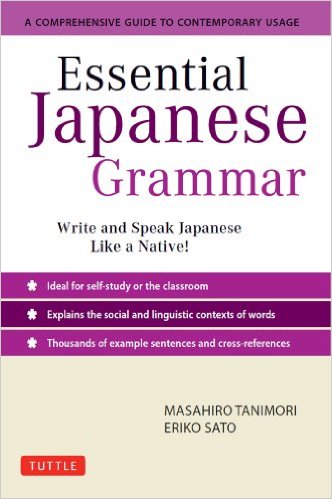After having gotten hooked on learning some legit Japanese for my trip to Japan last year, I’ve been rarin’ to continue my Japanese language skills for a future return trip to Kyoto study tea ceremony traditions. Thus, when given the opportunity to get a review copy of Essential Japanese Grammar by Masahiro Tandoori and Eriko Sato, I was happy to oblige.
The Good
One of the things I was really looking for in Japanese language books last year when I went shopping for them at LA’s Little Tokyo’s Kinokuniya Bookstore were complete sentences. With my trusty Ph.D. in language and literacy development, I knew flash cards weren’t going to cut it. I needed context, rich language environments.
One of the secrets of human learning is that less is not more, more is more. Often, we learn things better when they come in complex patterns than in single isolated bits. This is especially true in language learning, where learning a word by itself is like trying to understand the natural behavior of a fish by plucking it out of the water and plopping it on a plate, then studying it after it has decomposed a good deal.
So when I went Japanese language book hunting, I was looking for books with complete sentences, and even better, complete conversations with complete sentences.
Essential Japanese Grammar has tons of these, and not only that, you get lists of grammatically similar sentences. The benefit of this is that not only do you get to see words in their grammatical context, but you can also get more exposure to the syntax and vocabulary across structurally similar sentences.
Room for Improvement
Despite the treasure trove of rich organized grammatical structures in this book, it’s not a book that your average joe can pick up and start learning.
I’m sure the target audience of the book is probably more advanced Japanese language learners, but making it a bit more user friendly could probably have broadened the audience of this book.
The grammatical concept explanations were actually not that easy to follow. Despite being known as “The Writing Teacher” in my hood, I was not an English major in college (I did psychology in preparation for a career in education), and although I find grammar interesting, I’m not one of those people (of which I know many) who just love to draw those syntax trees. I am also not a grammar nazi. In fact, I find people who take joy in correcting everyone’s grammar rather annoying and even downright oppressive and colonial. I probably know more than the average person, but even so, I didn’t find the explanations in this book easy right off the bat.
After some careful reading and study, I was able to figure out the concepts that the authors were trying to convey, and they weren’t horribly complex, but they were being presented in a rather hard to digest way. Being a veteran teacher, I could see a million different ways I would have rewritten or reformatted the explanations to make it possible for even a pre-teen to pick and understand.
In fact, the format actually reminded me of this book Farnsworth’s Classic English Rhetoric by Ward Farnsworth. Both Essential Japanese Grammar and the Farnsworth book sort of have this traditional outline format of “Main Concept” followed by a laundry list of examples of that main concept. It’s organized and informative, but just not easy to digest nor user friendly.
I work with K-12 students all the time, and most if not all of the thousands of kids I’ve worked with would probably not get past that first page, even if they were really interested in learning Japanese thanks to avid video game, manga, anime, and light novel fandom.
Conclusion
This is a very useful and informative book that is indeed essential for any serious student of Japanese, but it’s probably only limited to advanced and postsecondary level students. If it were to be revised to be more user friendly, it could be more accessible to the beginning student of Japanese or someone with a cursory interest in picking up the language. With many of the high schools in my neighborhood having Japanese as a language option in high school, that could open up a whole new market for the book.
Either way, I know I’ll be meticulously working through this book to beef up my Japanese skills.









